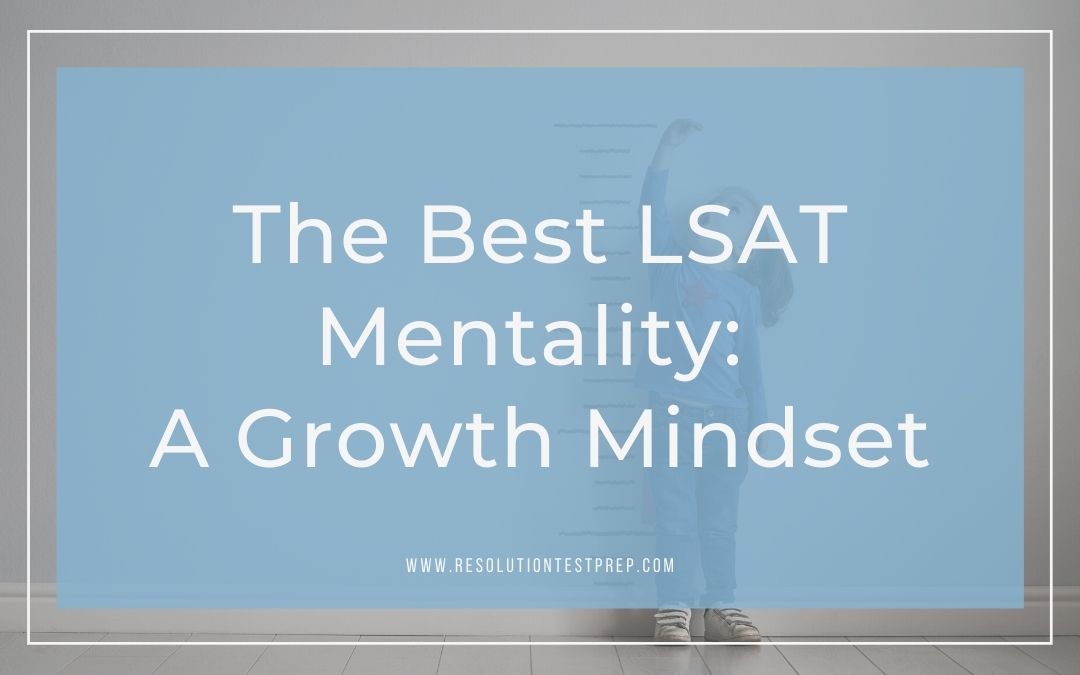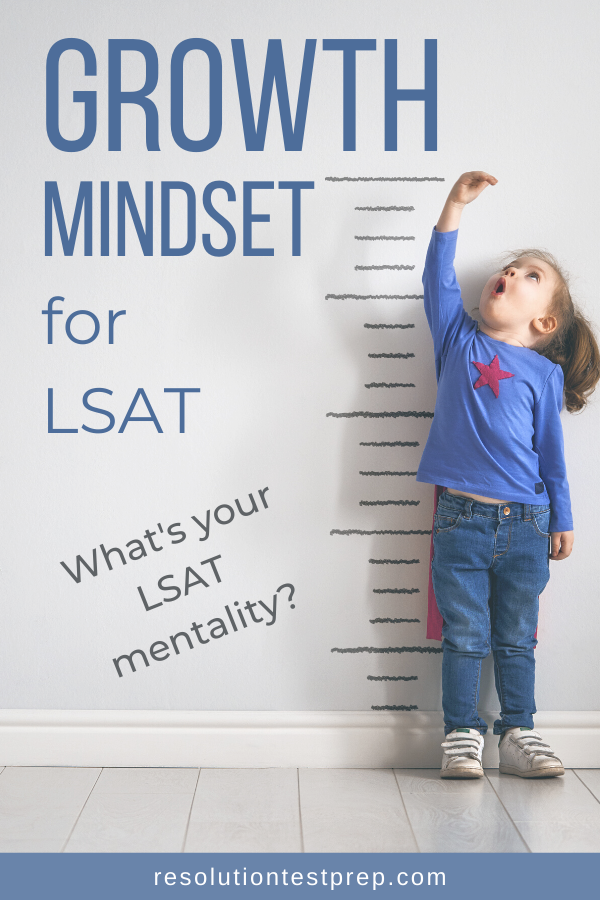The longer I’ve tutored, the more I’ve come to realize that the most important tool a student has is not the right materials, the right study plan, or the right tutor, but is instead the right mindset. With the wrong mindset, students get discouraged and progress slows. But the right LSAT mentality – a growth mindset – can propel students to work hard, seek progress, and ultimately exceed their goals for the exam.
In this post, we’ll draw on the ideas of psychologist Carol Dweck to talk about what a growth mindset for LSAT actually looks like, why it is so important, and how you can try to cultivate that mentality to set yourself up for success.
Book recommendation: Mindset: The New Psychology of Success, by Carol Dweck
Recognize any of these thoughts?
- “I’m terrible at spotting assumptions.”
- “I’m a slow reader.”
- “I still don’t get it, but I’m just going to move on.”
- “You got a 175? Must be nice to be a genius…”
- “You’re smart. Can YOU just take my LSAT for me??”
Consider for a minute what these statements have in common. What are they implying? Or what’s the necessary assumption underlying these statements?
You may be tempted to think the answer has to do with their negativity. That’s close, but it’s only half the story.
Instead, these statements all imply something about the fundamental nature of our abilities. Although some of the statements do it more overtly than others, they all suggest that our abilities are fixed, a static part of who we are rather than something we can cultivate and develop.
Here’s the phrases again with subtext:
- “I’m terrible at spotting assumptions. I don’t have that ability (and I probably won’t get better at it).”
- “Some people are fast readers and some are slow readers. I’m a slow reader. It’s part of who I am. ”
- “I still don’t get it, and I probably never will. I’m just going to move on.”
- “You got a 175? Wow, must be nice to be a genius… It’s because of your IQ. It’s not because you worked hard.”
- “You’re smart. Can YOU just take my LSAT for me?? You have a natural ability that I don’t have and can’t develop.”
It’s not about “feeling good about yourself”
I want to get this misconception out of the way. The thoughts above are destructive NOT because they make you feel bad. And NOT because they are markers of low self-esteem.
Instead, the real problem with having these kinds of thoughts as part of your LSAT mentality is that they focus on static abilities rather than development and change.
When you get stuck thinking your abilities are part of who you are, it’s hard to buy into the idea that you can change your abilities.
And that in turn makes it hard to put in a lot of hard work without getting discouraged somewhere along the way.
The Growth Mindset
I highly recommend Carol Dweck’s book Mindset: The New Psychology of Success for anyone studying the LSAT. In it, she talks about two ways of viewing success:
- Mindset one: Success comes from our fixed abilities – those we were born with and cannot change. Dweck calls this the “fixed mindset.”
- Mindset 2: Success comes from developing our abilities through hard work and effort. As you may have guessed, Dweck call this the “growth mindset.”
We’ve alluded to this distinction already, but here’s the kicker:
People with a growth mindset overwhelmingly outperform people with a fixed mindset.
Why might that be the case? Dweck explains it in terms of how we react to setbacks.
- When someone with a fixed mindset fails (gets a 130 on their LSAT practice test, bombs a LG section, etc.), they get discouraged. They view the setback as a reflection on their (lack of) abilities, and may even be tempted to give up.
- On the other hand, when someone with a growth mindset fails, they get energized. The failure is an opportunity to learn. They dig in harder because they recognize that with more effort, they’ll be able to improve next time.
You can also see the difference in how students take practice tests:
- A fixed mindset student asks “How did I do?” The test reflects their abilities, and they want reassurance that their abilities are strong. A practice test is a reflection of how they’ll do on their actual LSAT, and a practice test that doesn’t go so well can be a major blow to their confidence and motivation.
- On the other hand, a growth mindset student asks “How can I do better?” And in fact, they probably were already making mental note while they were taking the test of a few areas to work on. For a growth mindset student, a practice test is a jumping off point for future learning.
Why is this important?
None of us are born good at the LSAT. We all face struggles, especially at the beginning when we are working on developing new skills. The LSAT forces us to get better at thinking, which is a really difficult thing to do!
Having the right mentality when studying for the LSAT is therefore essential. We all struggle, and we all have times when it’s beyond frustrating.
My students go through these times as well. And I’ve noticed that I can almost always predict when a student is going to stay in that slump for a long time and when they are going to pull themselves out of it soon. The difference is entirely mindset.
The good news is that you can change your mindset.
Cultivating the right LSAT mentality
In order to switch your thinking to a growth mindset, you have to be aware of your thoughts, and you have to work actively to reframe them. For example, when you catch yourself thinking “I’m so bad at logic games,” actively rephrase your thoughts by telling yourself “No, that’s not right. I’m not good at logic games YET. But I can keep working on them and can get better.”
At first, this might feel a little too “fluffy,” full of unicorns and rainbows. So embrace the logical part of your future lawyer self and give yourself rational reasons to believe the growth mindset version of reality.
| When you find yourself thinking… | Stop yourself! | Rephrase the thought in a growth mindset… | And give yourself a rational reason |
| I’m so bad at logical reasoning. | No. That’s not right. | I’m not good at logical reasoning YET. But I can keep working on it and can get better. | I know that people can master the LR section. Some even do the section perfectly. But none of them started out that way. If other people can learn it, so can I. |
| I’m a slow reader. That’s not going to change. | Hold on. | It’s true that I read too slowly now, but that doesn’t mean I’ll always read slowly. It actually *can* change. | I can read more complex articles now than I was able to in high school, so I should be able to continue increasing my skills. I can work on reading speed by working on my comprehension skills and by knowing what to focus on while reading. |
Dealing with mistakes
One final thought. But actually it’s one of the most important things about your LSAT mentality.
A growth mindset should change the way that you think about wrong answers you get in the course of your LSAT prep.
It’s tempting to correct your work, look at the right answers, then move on to drill more questions. The problem with this approach is that you’re not actually learning from the questions. I mean, I guess it’s a good thing that you’re continuing to drill more, but it’s hard to make progress unless you really sit down and figure out where your mistakes came from and how to prevent them in the future.
If you want a tool that can help you take a more thorough growth mindset approach to your mistakes, check out my LSAT Practice Test Review Guide. In it, I walk students step by step through a review process that focuses on reflecting on your mistakes by creating takeaways that you can apply to future questions.
I also have a free resource for your LSAT review process: an Error Log spreadsheet. It’s an organized, sortable way to record exactly where you went wrong in a question and what you learned from it. The more thoughtfully you build your error log, the more you’re bound to notice and fix in your ways of thinking through questions. Be sure to also check out my other post to learn how to use an error log.


